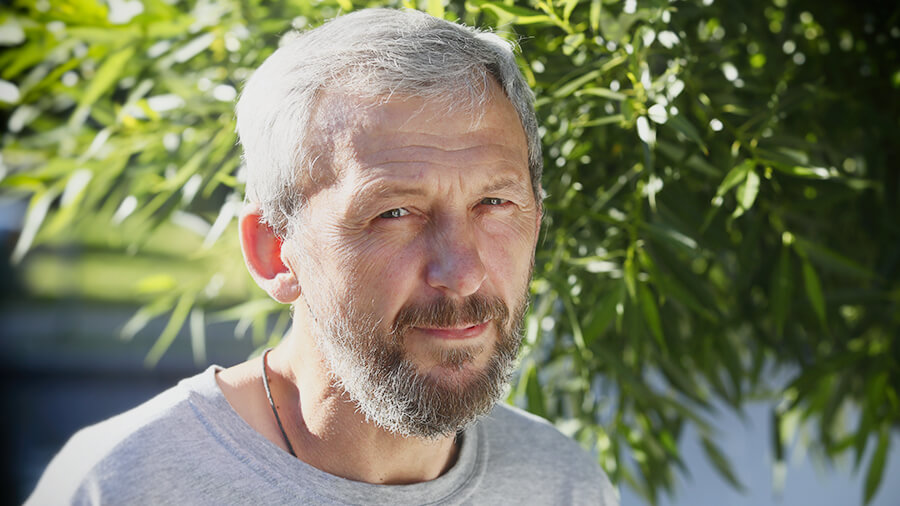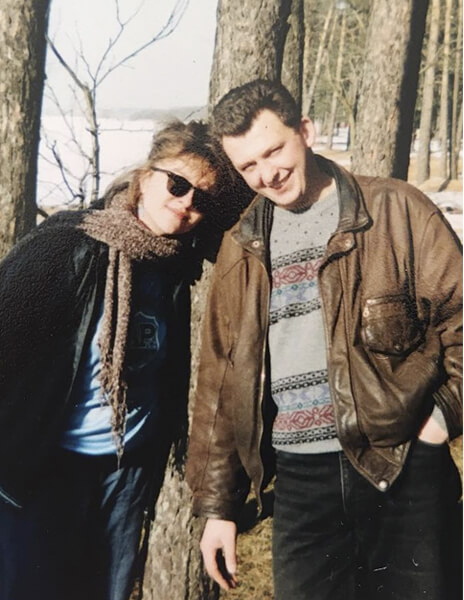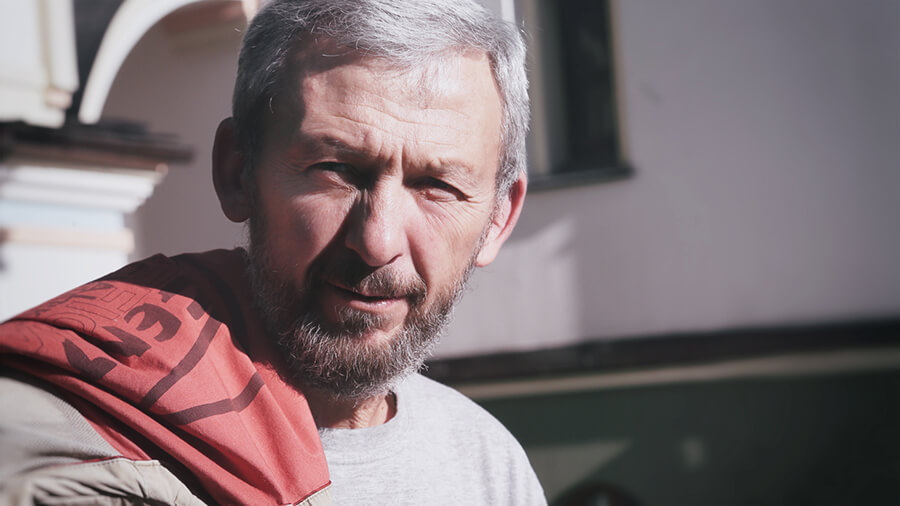
Alexander Sakovich
You came of age in the last years of the Soviet Union and grew up in the 1990s when the get rich quick mindset was dominant, and making long-term plans, let alone thinking of life eternal, was very uncommon. What would you say were some of the most important things that made coming to God a possibility for you?
After finishing school, I completed a course in a professional school, finished my internship and went to the army. When my military service was over, I came back to a different country. The 1990s were a very difficult time for us. Everyone was affected, it seems; we saw rationing and discovered unemployment.
I returned from the army, and there was no job for me. Private businesses we beginning to emerge. They were known as cooperatives. I managed to find employment in one of them, working on an animal farm construction project; I then went to work in another cooperative, which recycled paper and rubber. Their business model was very straightforward - buying the paper and rubber waste cheaply and shipping it in bulk to Sweden for foreign cash. - The waste was almost free; to encourage people to bring their waste, they were given vouchers to buy deficit books.
Cooperatives replaced the Soviet system. What kind of people were best positioned to start cooperatives? Graduates from the party school, versed in economics and Western-style market system. Connections and business acumen were in greatest demand back then.

Alexander with his wife
For the rank and file, however, these times were very tough. Many were engaged in speculation. Some who had access to cheap rationed goods were buying them in bulk and selling them in Poland or Moscow. We had been raised with the idea that speculation was illegal and criminal. In the 1990s, it suddenly became a legitimate business activity. Some of today's businessmen have grown out of it.
But there was also the other side of the coin - the bitter truth that the wealth that comes easy goes easy; people may get rich fast, but they can lose their fortunes even faster. To understand that your fast-gotten wealth not of your own making, but more the product of good luck is a very sad and sobering experience. It is also an opportunity to learn the hard way that you are worthless without the Lord.
You were baptised into Orthodoxy, but it took your time to become a regular churchgoer. What impact did the baptism and churchgoing have on you as a person, and how did it change the way you look at your life?
In the 1990s it became fashionable for young parents to have their children baptised. One of my friends had a newborn daughter and offered me to become her godfather. I said I could not because I was not a baptised Christian. He called me again a few days later. Apparently, he had talked to the priest and said: "Please come. The priest will baptise you first, or the two of you at the same time."
My friend's daughter was six months old. The baptism took place at the Church of Saint Peter and Paul in a southern suburb of Minsk. Back then, the church was still being built. Many people were taking baptism on that day; the ceremony was quick and did not leave any particular impression. My baptism did not bring me to go to church with any regularity, but I kept wearing the cross. I thought I ought to wear it because I had been baptised.
When my wife's father developed a medical condition, my wife went to church to submit a prayer request for his health. A sister of charity who accepted the request offered to buy a disc with recorded talks by Father Andrey Lemeshonok. These talks were the final push that put us on a path towards God.
We started to come to the Convent every Tuesday to listen to Father Andrey's talks live. Unlike most others, I was not writing notes with my questions for Father Andrey; but many people were asking the same questions that we would like to have asked. We knew that our difficulties, passions and desires were similar to those of nearly every member of the audience. I challenged myself to think about the causes of the events that happen in our lives, and I realised that they were the consequences of our own actions; something wrong that you once did to another comes back to you or to your kin.

Alexander
It might seem that you and your wife became the Convent's parishioners by pure chance – you bought a CD with Father Andrey's talks from a sister of charity at the spur of the moment, you decided to take your time to listen, and then came to attend them in person. Would you say that your coming to God and to the Convent was more accidental or providential?
Someone's coming to God is never accidental. It happens through somebody else's intervention or prayers. My father told me about my grandfather who went to a seminary. He left it when soon after the October revolution. He worked as a secretary. He was an inmate in a prison camp, building the Moskva River channel. He also was a soldier in World War 2. He may have been praying for me.
My older brother told me that my father used to visit a church and stay there for some time when he was on business trips to Moscow. He was a communist, why did he go to church? He would never have done so in Minsk - if his boss had ever seen him do that, he would have had him expelled from the party, and that would have been the end of his career. Perhaps he was a believer at heart, and God brought me to the church through his prayer. With the Lord, nothing is by chance. Everything is providential.
One important aspect of being a part of the body of the Church and having a relationship with God is partaking in the sacraments. Confession can be one of the most difficult of these, and many people will put it off to their detriment. How did you deal with your difficulties and what would you say to people in similar situations?
My wife and I began to come to worship services from time to time. We would spend some time standing at the all-night vigils, light a candle and leave.
As we stood at the worship services we realised that many people were taking part in the sacraments. We, too, decided to make confessions and take the eucharist. Standing up for a confession takes a lot of inner struggle; it is a great challenge to realise that the real obstacle to making the confession is not you, but your own passions and desires. There is also the fear of telling another person about your sins, and also the reluctance to do away with past habits. My first confession was very hard. It removed a part of the load off my soul and brought some temporary relief, but it did not take very long for me to feel burdened again. Not only did I feel making little progress, but I also realised that I was stuck in the habit of sin, and so the burden of the unconfessed sins continued to snowball.
The earlier the Lord brings you to church, the easier it is to change. Standing up to one's passions after decades of separation from God is extremely difficult. For example, I have been smoking for thirty years; it would have seemed that I consisted almost entirely of soot and tobacco smoke. It is quite a different story if someone had been smoking for just two or three years. I think it is the same with all of the sins, but it is probably hardest with addictions. One has to rely on God's help.

While working at the Convent, you accepted as one of your obediences visiting the patients at the nursing home for disabled adults. How much of a learning experience was it for you?
A brother with whom I was working at the Convent invited me one day to join him on his obedience at the nursing home for people with disabilities. At that time, I was not contemplating becoming a part of the volunteer group, I accepted the invitation out of interest.
There is an incredible simplicity to the way the nursing home patients talk, and even to how they greet you. In just one word "hello", they will say everything, simply and openly. I think that this simplicity comes from God itself. How likely are we to approach someone we do not know and say hello to him in the same way? We would probably be too afraid of what others might think.
The present-day location of our convent used to be the site of a mental clinic before World War 2. When the Nazis came and occupied Belarus one of the first things they did here was executing all the patients and their doctors. The doctors were Slavs, and the Nazis offered them to leave, but the doctors refused to abandon their patients and shared their terrible fate.
The Nazis were bent on rationalism and pragmatism. Mental patients could not be expected to plant cereals or to make shoes. Most importantly, they inspire love and compassion from others. The Lord himself had said: "Blessed are the merciful, for they will be shown mercy (Matthew 5: 7).
I would say that everyone at the nursing home is a believer and cannot live without God. All have a relationship with Him. When at church, some are praying as deeply and sincerely as few others can, others want to be held and comforted. Even as adults, they are very vulnerable and will cry like children.
Many people who live and work at the Convent view it as a part of their extended family. What does being a member of the monastic family mean for you?
I have kept visiting the adult patients of the nursing home ever since. Little by little, I had the feeling that the Convent had become my home. The more I am working and spending time with the people at the Convent, the more I feel that this community is becoming like a family to me.
The spirit of mutual help and assistance is always present here as the ministry of prayer and charity is ongoing. The clergy, monastics, and brothers and sisters of charity are helping the sick and the sufferers like our patron saint Grand Duchess Elisabeth did at the Marfo-Mariinsky Convent that she established. She has spent her entire fortune setting up hospitals and education facilities. Our convent, too, is running a school, farmsteads for vulnerable men and women, and it is offering spiritual guidance and support to patients of hospitals and nursing homes. I am happy to be a part of its service of God and people.
Interviewer: Darya Goncharova
Photo credits: Maxim Chernogolov, the personal archive of the Sakovich family.